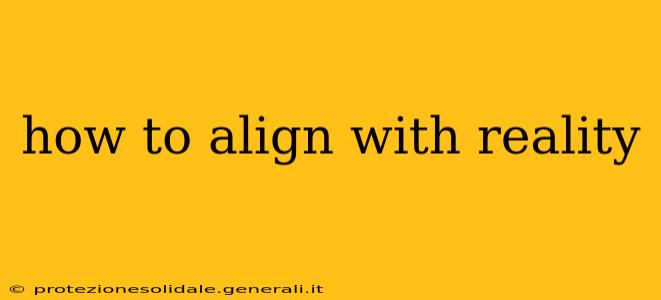Feeling disconnected from reality? Many of us experience moments (or even prolonged periods) where our internal world clashes with external experiences. This disconnect can manifest as anxiety, depression, unrealistic expectations, or a general sense of unease. Aligning with reality is a crucial step towards mental well-being and a more fulfilling life. This guide offers practical strategies to bridge the gap between perception and experience, fostering a more grounded and balanced existence.
What Does it Mean to "Align With Reality"?
Aligning with reality isn't about suppressing your dreams or accepting everything passively. Instead, it's about cultivating a balanced perspective – acknowledging both your inner world and the external world accurately. This involves:
- Accepting what is: This doesn't mean resignation, but rather acknowledging the present situation without judgment.
- Managing expectations: Setting realistic goals and expectations based on current circumstances.
- Living in the present moment: Focusing on the here and now instead of dwelling on the past or worrying about the future.
- Developing self-awareness: Understanding your thoughts, feelings, and behaviors.
- Building realistic self-esteem: Accepting your strengths and weaknesses without self-criticism or unrealistic self-inflation.
How to Improve Your Alignment With Reality
Here's a practical approach to enhance your connection with reality:
1. Practice Mindfulness and Meditation
Mindfulness encourages present moment awareness, reducing the power of racing thoughts and anxieties that often disconnect us from reality. Regular meditation can significantly improve your ability to observe your thoughts and feelings without judgment, creating space between you and your reactions.
2. Challenge Negative Thoughts and Beliefs
Negative thinking patterns frequently distort our perception of reality. When you notice negative thoughts, ask yourself: Is this thought truly accurate? What evidence supports it? What evidence contradicts it? Replacing negative self-talk with positive affirmations or realistic self-assessments is a powerful tool.
3. Set Realistic Goals and Expectations
Unrealistic expectations are a major source of disconnect from reality. Break down large goals into smaller, manageable steps. Celebrate your progress, and learn from setbacks. Remember that setbacks are a normal part of life and don't negate your overall progress.
4. Engage in Grounding Techniques
Grounding techniques help reconnect you with the present moment when feeling overwhelmed or disconnected. These can include:
- Sensory awareness: Focusing on your five senses – what do you see, hear, smell, taste, and feel?
- Deep breathing: Slow, deep breaths can calm your nervous system and center your attention.
- Physical activity: Exercise, yoga, or even a short walk can help ground you in your body.
5. Seek Professional Help
If you're struggling to align with reality, seeking professional help from a therapist or counselor can be incredibly beneficial. They can provide support, guidance, and tools to help you manage your thoughts and feelings, develop coping mechanisms, and improve your overall well-being.
How can I tell if I’m out of touch with reality?
Symptoms of being out of touch with reality can vary greatly, but some common indicators include experiencing persistent feelings of anxiety or depression, having difficulty maintaining relationships, making consistently poor decisions, exhibiting erratic behavior, or having significant difficulty functioning in daily life. If these concerns are persistent, seeking professional guidance is strongly recommended.
What are the benefits of aligning with reality?
Aligning with reality leads to improved mental health, reduced stress and anxiety, more fulfilling relationships, greater self-awareness, and an increased sense of control over your life. It empowers you to make sound decisions and navigate challenges more effectively.
What if I'm struggling to accept reality?
It's perfectly normal to struggle with accepting certain aspects of reality, especially if those aspects involve loss, grief, or trauma. In such cases, seeking professional support is vital. Therapists can provide a safe space to process these difficult emotions and develop healthy coping strategies. Remember, seeking help is a sign of strength, not weakness.
By consistently practicing these strategies and seeking support when needed, you can cultivate a stronger connection with reality, fostering a more balanced, grounded, and fulfilling life. Remember that this is a journey, not a destination. Be patient with yourself, and celebrate your progress along the way.
